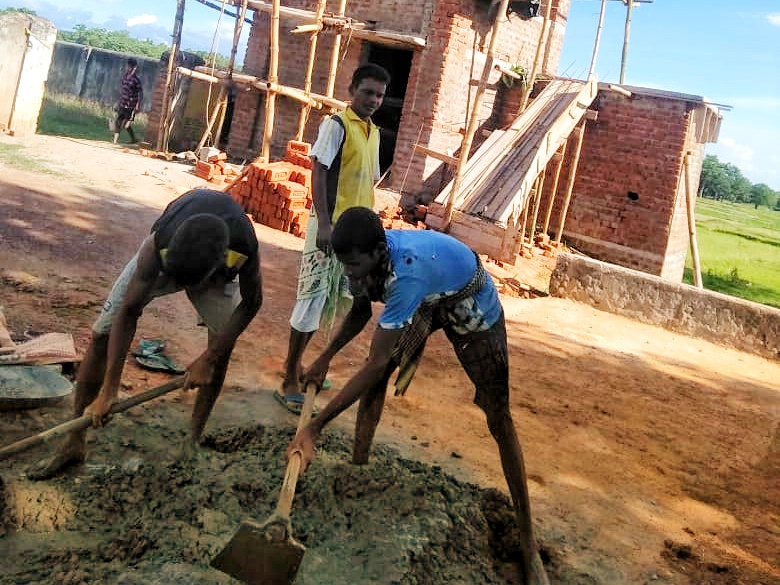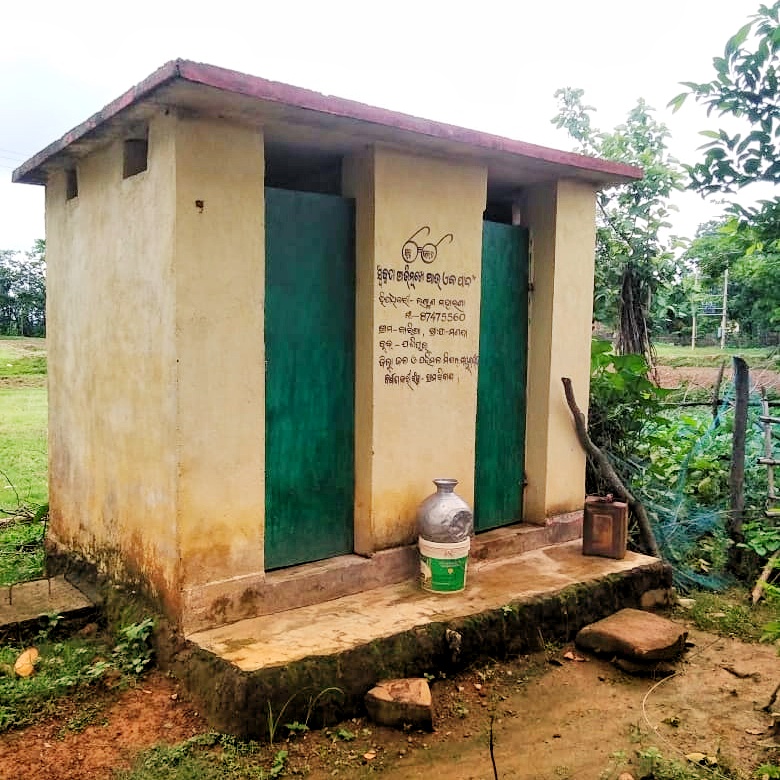Baria village community partners Gram Vikas to solve its water crisis
StoryBy Rahul Thekdi, Chandrika Patnaik
20 July 2020
From having no toilets and bathing rooms in any of the 74 homes to becoming open-defecation free, Baria village in Odisha’s Mayurbhanj district has come a long way. A collective action by a group of masons and the village committee is ensuring all households in Baria have access to safe sanitation and a 24X7 water supply.

Laxman Moharana, mason, overseeing the construction of the overhead water tank in Baria village, Mayurbhanj district.
Photograph by Deepak Mohanty
Ask any farmer in Baria to recall their mornings before the construction of TBRs in homes. Most of them will recount guarding their precious fields from the villagers using it for open defecation. The farmers were at their wits’ end from protecting their fields with the polluting effects of daily defecation. The neighbouring village, Biunria, just a kilometre away had a different story to tell.
In 2015, a few masons from Baria visited Biunria for the construction of an overhead water tank and saw the benefits of the piped water system established by Gram Vikas. Not just water but every household in the village also had individual toilet and bathing rooms (TBRs). All of them had functional, household piped water supply with 24×7 water being available through three taps.
Inspired by what they saw in Biunria, the masons approached the Village Development Committee (VDC) of Baria and narrated their eye-witness account of Biunria’s transformation. Laxman Moharana, one of the masons who visited Biunria made an impassioned argument for Baria emulating its neighbouring village. The VDC listened to the plea of masons and reached out to Gram Vikas.
Gram Vikas explained to the VDC that in order to get its support for water supply, every single household in Baria had to come together and pay in kind or cash to construct TBRs. Getting water was contingent on the community’s willingness to build toilets and bathing rooms to adopt and practice safe sanitation. The VDC understood the connection between safe water and sanitation, and agreed to the condition.
Gram Vikas organised a meeting with the village community to narrate the processes in constructing TBRs. Initially, there was resistance from the community as they felt they could not afford the cost for constructing the TBRs. The high cost led few of the poorest families in the village to continue to favour open defecation over safe sanitation.
Despite a sustained awareness drive with regular meetings in three hamlets of Baria, narrating the benefits of TBRs at homes and potable water at the doorstep, the impasse over the costs of constructing TBRs remained. But the water work could start only if the community found a way to make TBRs a reality for every household. The village had to come up with a solution to help those community members who are poor and could not afford to pay.
The newly formed Village Water and Sanitation Committee (VWSC) decided to sell Eucalyptus trees on the surrounding lands of Baria. These trees were grown for commercial purposes. The idea was to use the revenue for the community fund earmarked for Baria’s development. Two lakhs rupees generated from the sale of Eucalyptus was used for constructing TBRs in the homes of the poorest families in Baria. Gram Vikas provided technical support for setting up the water supply system and TBRs, organised construction materials for TBRs up to the roof level and facilitated the subsidy of ₹5,000 per family entitled under the Swachh Bharat Mission (SBM).

Toilet and bathing room constructed for every household in Baria village to enable healthy living. Photograph by Deepak Mohanty
By the end of 2019, all the families in Baria had TBRs at homes. Currently, with support from charity: water, the work of an overhead water tank with 25,000 litre capacity is under construction. Laxman Moharana, who urged the VDC to follow Biunria’s footsteps on adopting safe sanitation was flushed with pride while constructing the tank for his village. Once complete, the tank with properly laid out pipes will provide water to every house in Baria.
Khagapati Patra, the VWSC member who spearheaded the campaign expressed his gratitude to the entire Baria community for adopting the safe sanitation model with TBRs and piped water system. The VWSC has converted a place beneath the water tank into a community room with an attached bathroom for guests and visitors.
Maheshwar Mahakud once spent countless mornings in keeping a vigil-eye on people approaching his field for defecation. Now he is eagerly waiting for the piped water supply system to be completed, “I look forward to the day when I can walk around my field without the stench of urine and faeces.”
Once none of the 74 homes in Baria village from the Mayurbhanj district of Odisha had toilet and bathing rooms (TBRs). Today, Baria has come a long way by achieving the open-defecation free status because of a 24×7, household piped water supply system and toilets and bathing rooms.
Work on overhead water tank in progress in Baria village.
Photograph by Deepak Mohanty
ACKNOWLEDGEMENT
Deepak Mohanty collected data for the story. Priya Pillai edited the story.
ABOUT THE AUTHOR
Rahul Thekdi is a communication intern and Chandrika Pattnaik is a Junior Manager at Gram Vikas.
RELATED BLOGPOSTS
Turning losses into gains: How Mallipanka farmers find success in new crops
Reviving agriculture: Mallipanka’s first strawberry farm story.
Ensuring dignity beyond life: supporting migrant families in their darkest hours
Gram Vikas ensures safe migration and dignified repatriation for deceased migrant workers, supporting bereaved families.
Collective leadership transforms ageing overhead water tank to secure household water supply for all
Kalakhadi’s aging overhead tank revived through collective leadership, ensuring sustainable water supply for the community.